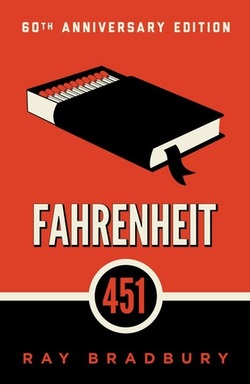 Yes, Fahrenheit 451 is a cornerstone of dystopian literature, and an effective argument against censorship... but couldn’t it be a good book, too?
The story takes place in a not-too-distantly futuristic society where entire rooms are converted into television screens, people are even more passively ambivalent to issues than they are today, and, oh yeah, the job of the “firemen” is now to start the fires, rather than stop them. Books are illegal, you see—all books—so if you’re suspected of having any of them stashed away… well, you’re going to get a visit from the firemen.
Our protagonist, Montag, is one such fireman who develops an affinity for the books he burns, and the story basically follows his struggles to make a difference in this world where no one really cares anymore.
Well, this book was certainly a disappointment. I don't know, maybe my expectations were too high going into it? But there are some pretty serious flaws with this “cornerstone of dystopian literature”:
(WARNING: BELOW THIS LINE LIE SPOILERS AND ANGER-CAPS.)
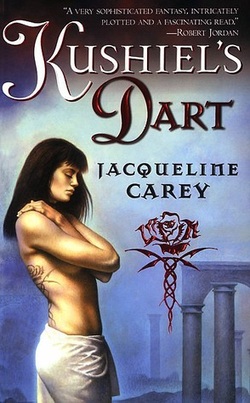 This review is for my second read of this book; I read it first in 2010. Loved it again, though I noticed a few flaws now that I didn’t then—of course, relieved of the suspense, I could dwell more on the actual writing. Still, there was much of literary merit in the book, as well as the enjoyable tale I remembered.
The story takes place in an alternate-universe France, following Phèdre, a young woman trained first at a highly-respected pleasure-house and later at the knee of a political intriguer. From the beginning, though, she is marked out from the other courtesans-to-be by a mote in her eye—the touch of the angel of pain, and a sign that she is an “anguissette,” one who derives pleasure from pain. As she comes of age and begins taking assignments, collecting information from her clients via pillow-talk and delicate manipulations of their emotions, she becomes steadily more embroiled in the conspiracies and machinations surrounding her country’s elite—and when the time comes that she knows too much, she (and her reluctant bodyguard) finds herself the target of more pain than she signed up for.
It is an easy thing, I think, for a book containing BDSM sex scenes to fall either into the "mindless erotica" or "rape glorification" categories of trash. (For example, A.N. Roquelaure/Anne Rice's Sleeping Beauty trilogy I would call "mindless rape glorification".) This book, however, is resoundingly neither of those literary sins. It is far from being mindless or, I'd argue, even erotica—the sex scenes are not nearly as explicit as one might expect, and are far overshadowed by the intricacies of the novel's many plots and subplots. And, though there is nonconsensual intercourse, the main character's reaction to it is to be thoroughly repulsed, even as her masochistic nature leads her to feel pleasure in it. In this way, as in others, the book walks a fine line, but manages to maintain a steady moral compass.
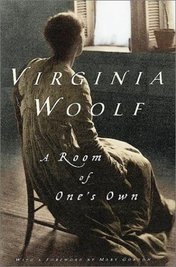 I’ve just started reading A Room of One’s Own (which I hope you knew without me telling you is by Virginia Woolf), and though I’m only a chapter in, I feel the need to blog about it.* If you haven’t read it (I’m betting most people haven’t, as it’s unencouragingly dense with Woolf’s typical long-winded and tangential style), it’s basically a compilation of Woolf’s thoughts on woman writers of fiction, from what is necessary to be a woman writer (shock of shocks, one needs a room of one’s own) to the various obstacles facing female scholars. By the end of the first paragraph, I was fairly overwhelmed by the fact that this issue being written about eighty-five years ago is still entirely relevant today—not necessarily to the same extent as Woolf was facing (in the U.S., at least), and certainly not only to the gender-spectrum she’s addressing here, but there were more parallels than I could stomach silently. Those who have read Woolf will back me up when I say: Her narration has less to do with the action than with the stream-of-consciousness descriptions. ARoOO [1] is no exception. However! There is some sort of movement to the story, and that’s the main thing I’m going to talk about, since there’s a certain fairy tale morality-story structure to it.
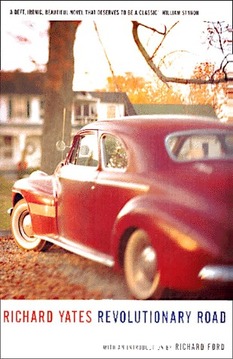 This book is sharply different from any I would normally read, but I picked it up because a writing teacher claimed that it was her favorite, and that the novel I was working on reminded her of it—she wouldn't tell me how or why, only that I needed to read it for myself. So now I have, and I do see the resemblance, though I'll not go into it overmuch here.
Revolutionary Road is a very honest look at married life in the suburbs in 1950s America—certainly the best of that type I've ever read, though that would say a lot more if I'd ever read another book on the topic. The setting was, unsurprisingly, similar to that of Lolita, and the characterizations reminded me of those in Catcher in the Rye—except, where Holden Caulfield is a whiny, narcissistic phony of a slacker student, Frank Wheeler is a self-conscious, narcissistic phony of a slacker office worker. Not to mention the fifteen-year age difference. But that is neither here nor there.
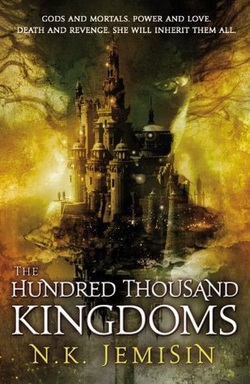 SPOILER WARNINGThis post makes reference to events throughout N.K. Jemisin's The Hundred Thousand Kingdoms. If you haven't read it yet (and plan to), I recommend skipping this! (For my spoiler-free review of the book, click here.) Jemisin is clearly trying very hard to write a story with a feminist angle to it--the world is imbalanced largely due to the death of the only goddess; Nahadoth, our love interest, was a gender-fluid deity; most of the major players are female; Yeine comes from a matriarchal tribe of warrior-women—but in none of these cases does she take the story quite far enough. In falling short, she actually draws attention to these flaws, causing great irritation in those of us who care about this sort of thing.
I did a full write-up on this book (from its pitfalls to its most useful sections) over on the Writing blog, so check that out if you're interested in more than this quick rating + recommendations.
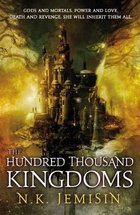 (I'll be posting a spoiler-ful feminist tirade about this book in about a week -- stay tuned!) (EDIT: HERE.) This book is right up my alley—female protagonist thrown into an unfamiliar and extravagant setting with ulterior motives all around? Yes, please! It drew me in right from the opening statements:
I am not as I once was. They have done this to me, broken me open and torn out my heart. I do not know who I am anymore.
I must try to remember.
|






 RSS Feed
RSS Feed





